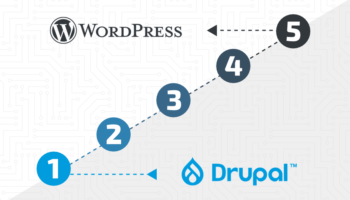
I recently overheard a conversation between a couple of friends.
Friend #1: “I’ve been running my own small entertainment business for a few years and I’m having trouble getting out to possible new audiences with just Facebook. I’ve been thinking of finally setting up my own website.”
Friend #2: “I don’t think you need a website, those are old news. You’re better off setting up a cheap free site and focusing on improving your social media presence since it’s free.”
I don’t necessarily agree with Friend #2 as that seems to be a bit of a limited view of how the web works, but I think many folks out there are struggling with this same problem. Mainly, the person is already using some aspect of social media and hasn’t been able to rely simply on that.
I have a feeling a lot of new smaller enterprises are going to take that same approach, and while it’s not a totally incorrect way to look at how people use the internet, there are various areas to look into when trying to come up with a specific direction for marketing yourself or your business.
Here are some things to think about:
Know Your Business and Industry – Each company is different and each customer base is different. Let’s say Business X sells windows and Business Y offers karate classes. Because these are very different business models, each should have a different approach to their marketing. What’s the audience’s intent when visiting your site? Are they there to view details, contact you, or purchase something?
Business X will most likely have clients that visit multiple times to review details, request information and probably would want to talk to someone before purchasing. They would need areas of the site that have technical details, as well as specific calls-to-action to encourage users to submit information on a product that interests them.
Business Y should expect new and existing users to seek out information on their site as well as to sign up for classes and services. They should engage in something like a blog to ensure their current and future clients can read about topics that the business is an expert in.
Which Social Media Platform is Best? – In both examples above, social media can play a great role in ongoing engagement with your current users as well as recruiting potential clients. The most important question is: which social media platform do your current customers use?
Business X would have a more mature audience based on the fact that you need to own a home or business if you’re going to purchase a window. In their case, Facebook would be a good fit as the most popular user ages are between 25 and 55. For Business Y, they would want to use Facebook, but put more focus into Instagram as 90% of their users are under the age of 35. Twitter could also be an option, but oversaturation of the app has caused a lot of people to move onto something else. Business Y would also see a lot of returning users or students who will check in frequently, so posting images and videos of new classes, demonstrations, etc., will have a huge benefit.
Most social media outlets will promote user engagement. Having a presence on all is definitely recommended, but be sure to spend your time wisely and focus on the one your current users and potential clients spend the most time using.
Benefits of Websites

There are still huge benefits to having your own website and not just relying on social media to promote your company. The primary benefit is exposure from search engines. Google, Bing and other search engines are still a major driving force on the web as there are always services, products, and information that people need to find and don’t know where to go. A properly structured and optimized website can get a potential client that is actively searching for something you offer to contact you directly or submit their contact information to you.
The search aspect is really what differentiates websites from social media. Social media will come up for some related searches, but most are hidden from public view unless you are logged in as a user on that platform. If you’re someone who’s searching for a specific service or product, you probably wouldn’t just check out their Facebook or Instagram page and find a simple and direct way to view the details of whatever you’re searching for – and you certainly wouldn’t have a reliable way of leaving your contact information.
Having a website also allows you to manage your own brand on a finite level (more on that below). Social media often relies on user comments or some sort of upvoting/sharing aspect, which can be a positive or negative experience as users on free platforms often have no problem posting something offensive. With your own site, you can have pages and areas of expertise that aren’t up for public comment and you can control aspects, such as a blog, where you can post about specific topics that are educational, informative, and that directly ties you to your business.
Benefits of Social Media

Having an interactive relationship with your users is one of the most important benefits of social media marketing. You can inform your users by simply posting status updates and images, and you can even take it further and ask users to vote on questions and future products, or be transparent and show users things they wouldn’t typically see with another company or competitor. This type of engagement can promote trust and loyalty in your brand.
The most beneficial aspect is being able to market directly to your users and audience, and hope that they share your company with their friends and relatives. Depending on the type of service you have, there are also benefits to being able to offer specials or giveaways via social media to your existing client base. It is important to remember that it is not enough to simply exist as a company on a social media platform – you need to be an active user to get any return on the time you spend on updating them.
Managing your Brand
The overall goal of any online marketing, whether a website or simply social media use is to effectively market your brand. With websites, you have more direct control of what people have access to and what you want people to learn about your business. Social media adds the layer of being able to interact with customers and use it as an additional marketing tool to communicate, reach out, and advertise events.
One of the most important things that companies forget to do is to use both to complement each other. Having social media links on your website will make it easy for any existing or new user to seek you out on those channels – where you have additional opportunities to market specific products and services. Aside from the obvious, such as matching the branding you use on your website with that of your social media, you want to make sure your messaging on all platforms is consistent.
Remember that users and potential customers don’t always think the way you do about your specific business or industry. Try to look at any realistic marketing options but don’t be afraid to try something new.





